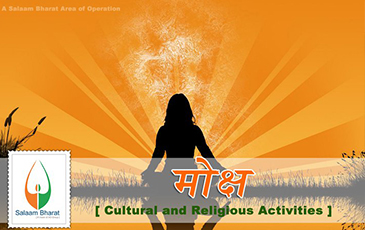
Cultural $ Religious Activities
Religion is a collection of cultural systems, belief systems, and worldviews that establishes symbols that relate humanity to spirituality and moral values. Many religions have narratives, symbols, traditions and sacred histories that are intended to give meaning to life or to explain the origin of life or the universe. They tend to derive morality, ethics, religious laws or a preferred lifestyle from their ideas about the cosmos and human nature.
The word religion is sometimes used interchangeably with faith or belief system, but religion differs from private belief in that it has a public aspect. Most religions have organized behaviors, including clerical hierarchies, a definition of what constitutes adherence or membership, congregations of laity, regular meetings or services for the purposes of veneration of a deity or for prayer, holy places (either natural or architectural), and/or scriptures. The practice of a religion may also include sermons, commemoration of the activities of a god or gods, sacrifices, festivals, feasts, trance, initiations, funerary services, matrimonial services, meditation, music, art, dance, public service, or other aspects of human culture.
The development of religion has taken different forms in different cultures. Some religions place an emphasis on belief, while others emphasize practice. Some religions focus on the subjective experience of the religious individual, while others consider the activities of the religious community to be most important. In many places religion has been associated with public institutions such as education, hospitals, the family, government, and political hierarchies.
Religion is what promotes people to follow the principles of humanity and brotherhood. For centuries, people have been coming to India from different part of the world, sometimes attracted by her prosperity and sometimes by her enriched culture. Unlike other countries India accepted all these races without any discrimination. In this way, India has become home to people from all religions and these people have same respect and love toward her.
Another aspect is that of culture. The people coming from different part of the land and having different religious background have different cultural practices too. India has a peculiar tendency to accept good things from anyone rather than being rigid on her own ideas. This gave rise to precious culture formed by combination of different customs and traditions. So ignoring religious and cultural aspects will make salute to the nation incomplete. India is known for her culture and to retain our recognition, we need to protect our culture.
India's languages, religions, dance, music, architecture, food and customs differ from place to place within the country, but nevertheless possess a commonality. India is the only country in the world to have so many religions and beliefs. The culture of India is an amalgamation of these diverse sub-cultures spread all over the Indian subcontinent and traditions that are several millennia old.
Regarded by many historians as the "oldest living civilization of Earth", the Indian tradition dates back to 8000 BC and has a continuous recorded history since the time of the Vedas, believed variously to be 3,000 to over 5,500 years ago. Several elements of India's diverse culture — such as Indian religions, yoga and Indian cuisine — have had a profound impact across the world.
